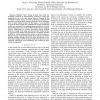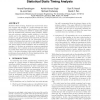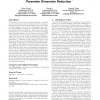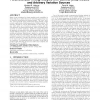136
Voted
ASPDAC
2006
ACM
15 years 8 months ago
2006
ACM
- One of the critical issues in MTCMOS design is how to estimate a circuit delay quickly. In this paper, we propose a delay modeling and static timing analysis (STA) methodology ta...
123
Voted
DATE
2009
IEEE
15 years 9 months ago
2009
IEEE
— Statistical static timing analysis deals with the increasing variations in manufacturing processes to reduce the pessimism in the worst case timing analysis. Because of the cor...
94
Voted
ICCAD
2001
IEEE
15 years 11 months ago
2001
IEEE
In this paper, we study the propagation of slew dependent bounding signals and the corresponding slew problem in static timing analysis. The selection of slew from the latest arri...
106
Voted
ICCAD
2003
IEEE
15 years 11 months ago
2003
IEEE
Static timing analysis is a critical step in design of any digital integrated circuit. Technology and design trends have led to significant increase in environmental and process v...
125
Voted
ICCAD
2005
IEEE
15 years 11 months ago
2005
IEEE
Based on a timing yield model, a statistical static timing analysis technique is proposed. This technique preserves existing methodology by selecting a “device file setting” ...
114
click to vote
ICCAD
2006
IEEE
15 years 11 months ago
2006
IEEE
Statistical Static Timing Analysis has received wide attention recently and emerged as a viable technique for manufacturability analysis. To be useful, however, it is important th...
94
Voted
DAC
2004
ACM
16 years 3 months ago
2004
ACM
128
Voted
DAC
2004
ACM
16 years 3 months ago
2004
ACM
Current Static Timing Analysis (STA) techniques allow one to verify the timing of a circuit at different process corners which only consider cases where all the supplies are low o...
123
Voted
DAC
2007
ACM
16 years 3 months ago
2007
ACM
The ability to account for the growing impacts of multiple process variations in modern technologies is becoming an integral part of nanometer VLSI design. Under the context of ti...
101
Voted
DAC
2008
ACM
16 years 3 months ago
2008
ACM
Many recent techniques for timing analysis under variability, in which delay is an explicit function of underlying parameters, may be described as parameterized timing analysis. T...




